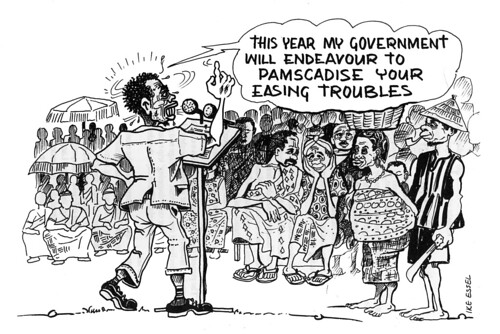By Way of Ionesco
It must have been a few months ago, I was heading home after work; it was the usual thing, a perfectly ordinary evening. As usual, I was fumbling with my various bags, headphones and such. As I switched trains at Oakland, my sharp elbows ensured that I obtained a seat; I find it pays to be equipped at rush hour. I settled down, rummaged around and found my book. I opened it and relaxed; there's nothing like getting lost in a good book on the commute. A muffled announcement predicted a delay. Oh well, I settled in for the long haul. After a few moments, I heard someone muttering from across the aisle: "Ionesco" or something.
"Yes, yes", I gestured at the distinctive cover of my book, "Ionesco".
The guy continued talking but I couldn't quite hear him since I was listening to music. As I fumbled around with the controls to the cd player (no ipod as yet), it struck me that I had been speaking in French. What I had actually replied was "Oui. Oui. Ionesco... C'est La Cantatrice Chauve."
As I finally removed my headphones (those tangled wires), I realized that the other guy had also been speaking in French.
Well, no matter. If you're reading a French book on the subway, odds are that a passing Frenchman would notice and engage you. Perhaps you look vaguely francophone. It would stand to reason that you would start to speak in French also. Indeed the reason I had been reading that book was one of my periodic attempts to keep up my French. Still it was uncanny how I had unconsciously slipped into that other language, perhaps a switch had been involuntarily flipped as sometimes happens to polyglots (pdf). I don't get to speak the language much these days - I am awful about keeping up with the part of my family in France. True, every few months or so I dream in French (don't ask, don't tell) but I know that my fluency in conversational speech is at risk.
So anyway, there was a little pause as we both assessed each other. A couple of relatively thin thirtysomethings, hungry engineer types. Not many people chat on the subway, one is always wary about being solicited or otherwise bothered. As the song goes: don't talk to strangers. How often, however, does one find someone interesting on the commute?
Well, the conversation began in earnest. Ionesco it was. His plays, his ideas, the theatre.
What do you know, I was sitting across from someone who had directed four Ionesco plays; a fellow Ionesco afficionado no less. I'd acted in Les Chaises during my brief theatrical career at school. Heck I still sometimes view the world through his jaundiced lens. The guy was clearly a creative type, steeped in the stage. A man after my heart. And he knew his stuff it seemed.
Pretty soon we were getting into the intricacies of Ionesco's world. What we liked: the playfulness of the language, the sense of rhythm, the stacatto effects that leapt from the page. The often startling juxtaposition of mundane minutiae with profundity. The pauses and the fumbling to find meaning and the consequent resort to words that obscure rather than reveal. Heady stuff in other words.
My spoken french is a little rusty and, a couple of times, I too struggled to articulate some of these thoughts. It's one thing to write or read about the intricacies of art and another to verbalize them even forgetting the setting. Still it was coming back slowly: the quintessential abstractions of extinct philosophers. The accent too - I was a scion of la Lorraine, straining my 'ains'. Perhaps the long lamented fluency would be returning soon.
Somehow we got onto the nomadic element in Ionesco's writing and the fact that he was Romanian and first gained fame writing in french in a piece about observing the English. What is it about outsiders being such stylists? Why are they often the best bridges and windows on society? Perhaps the margins provide a good standpoint for cultural observation. But what are the downsides of the lives of exiled souls? Does multi-lingualism or the crossing of linguistic borders sharpen one's outlook? We weighed the evidence. I brought up Nabokov who in later life turned out to be perhaps one of the great stylists of the English language. He wasn't impressed, he felt that Ionesco got closer to the gypsy element of modernity than Nabokov ever did. I demurred, both, I thought, were modern travellers that disdained boundaries and pushed the forms in which they wielded their pens. The response: well Ionesco carried less baggage. Anyway we got back to the plays.
He liked Rhinoceros and Les Chaises for their theatricality but for him La cantatrice chauve was the most playful with the language. We went back and forth on whether it was a play best performed in French. He didn't like the English productions he'd seen and claimed that they got the zaniness all wrong. I thought that so long as you got into the spirit of things, it didn't matter. To him the confusion started with the way the play's title was translated: he preferred The Bald Prima Donna to The Bald Soprano. Thus we found ourselves seriously arguing away in French about which English translation of a nonsensical phrase a Romanian playwright had promulgated was truer to the essence of the play. I can't imagine how we must have sounded to the rest of the train car: flurries of French intermittently interupted by English exclamations: "The Bald Soprano" or "Mais non. The Bald Prima Donna". C'est ridicule, n'est-ce pas?
Funnily enough we never actually mentioned the word absurd although the theatre of the absurd was our ostensible subject. Nor indeed did we get to Beckett who looms large in such matters. To my mind, Ionesco is the more formidable pillar of that theatre, if only because his conceptions weren't as arch as those of Godot's father. The discongruities of modern life are presented simply and with wit. I love Beckett to death yet his edifices were intricate constructions. Ionesco makes the absurd more mundane, it is through almost imperceptible distortions that you find yourself in the realm of the improbable. Each step on that road makes sense.
There was a brief diversion onto Sartre - we discussed Huis clos, and judged him impractical. More to the point, his dilemmas weren't weren't of the everyday variety nor indeed did they work on the stage. No, not quite.
I hipped him to the show I'd seen in Boston a couple of years ago, Ionesco not Ionesco, three rarely performed plays. The takeaway message: Ionesco as the aspirin for modern day life, the playwright of the fringe, the governor of the borderlands. You are easily underestimated if there is a humour to your approach and many did underestimate the fugitive notions of the man.
I forgot myself for a moment, soaking in the discussion, and looked around. The rest of the car looked utterly bemused at the sight of these young men vigourously discussing French literature in their midst, throwing out existential themes — the left bank transplanted to the subway car, heck all we were missing were the berets. No matter.
It was the week of the French elections and I mentioned the story about those old campaign posters of Mitterand that were being resurrected twenty years later as ironic commentary on the choices facing the French. He liked the idea and applauded the juxtaposition. A François Mitterrand 2007 campaign seemed appropriate for this dark time. We wondered how many votes he would get.
The Cold War deserved a Ionesco. The nuclear age deserved a Ionesco. Gremlins and parasites, thine playwright is Ionesco.
We wondered who were the heirs to Ionesco's ethos. We decided that there was something to be said for plays even in this TV and film era. That the stage often had the right level of pathos for the strange incongruities of the human condition. As we parted (he gave a card, I told him to google me), we resolved that we should get back to the theatre, support it in whatever way we could. Who knows maybe we'll put together a production some time soon. It need not be Ionesco. Heck we would write our own plays.
...
When a week or so later, I received that secret tape of Negroponte meeting Gaddafi, I was struck by the element of malign play among in their discourse and world views. As I transcribed, I found it was all there: words intended to obscure, words that ostensibly communicate were instead combined into phrases that mangle reality: constructive engagement, collateral damage and so forth.
The playground of misdirection is often dominated by politicians but others too have their niches. The lowly bureaucrat and the well-meaning citizen play their part is adopting the language of bromides. Ionesco would have loved the notion of recent non-specific general threats and the obfuscation of the language of homeland security.
In any case, it stands to reason that I am now being read by folks from both the US Navy Marine Corps and Libyan embassies around the world. I do try to bring people together in my writing. A belated welcome to the toli. Enjoy your stay. Excellent. Excellent discussions.
Salut Alex.
File under: Ionesco, subway, conversation, observation, culture, theatre, literature, language, French, France, absurd, art, life, Bay Area, Things Fall Apart, toli



6 comments:
I really enjoyed this.
I saw this awe-inspiring production when I was still a New Yorker, and, therefore, an interesting person.
Words intended to obscure.
You bring back old memories my friend. As illogical as it sounds I played the Logician in my high school production of Rhinoceros. Ionesco is a delight and sparked many many discussions as we navigated our way to understand this work.
I hope you are well these days. You are missed.
Après presque deux mois d'attente pour une nouvelle mise à jour de toli, c'était un vrai plaisir de vous lire, comme toujours.
(et maintenant il faut que je relise Ionesco!)
Excellent post, fun and interesting. I studied an Ionesco play at school, far too young and it menat nothing to me but it stayed in my mind and one day it all made sense to me. Then I realised his brilliance!
Are you doing anything specific to attract the US Navy ? lol
i believe that your writing can bring people together its amazing! your writing means something, good luck!
Cheers,
Diane
Post a Comment